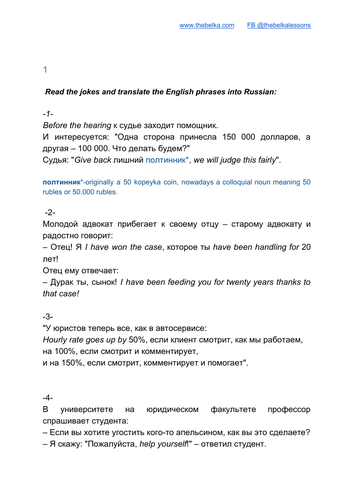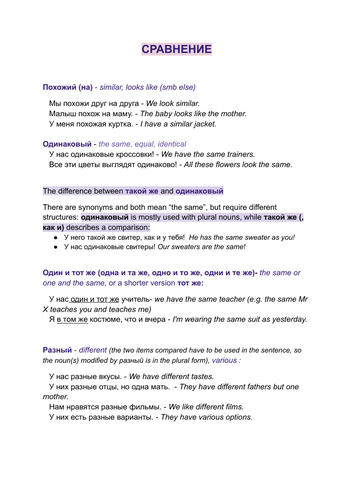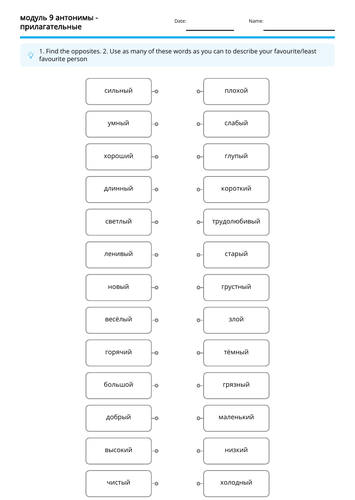101Uploads
16k+Views
1k+Downloads
World languages

Russian for kids: сколько лет? Как зовут? Что у тебя есть?
A 12 page printable workbook to practise asking and answering questions using the following constructions:
Его/ее/ зовут… - his/her name is
У него/нее/них есть - he has
Ему … лет/год - he is … year old.
Practise Dative and Accusative cases personal pronouns.
The resource can be used for teaching bilingual and heritage children as well as adult Russian learners.
We included teaching recommendations: 8 different ideas on how to use the cards creatively to practise grammar and encourage speaking.

Russian for kids. Letters , numbers, colours
A colourful worksheet that can be used in class or as part of home learning to help children memorise letters, learn and practise colours, new words and numbers 1-10.
ask children to find the letter the suggested word starts with
ask them to find all the green/red letters
ask them to count all the green/red letters or objects
ask them to count all the animals, fruits, etc.
ask them to test you! Kids love catching adults making a mistake!

Russian language: learning to write first words
A colourful printable 22- page workbook for bilingual, heritage and native Russian speaking children.
The focus is on naming and spelling the words suggested by the pictures.
The book comes with teaching recommendations with a lot of ideas on how the worksheets can be used.
We also enclosed a copy of the alphabet that can be cut up into cards and used to build the words before copying them into the workbook.
The book is appropriate for classwork as well as independent work at home.

Russian Verbal Aspect
This is an video tutorial where I explain the concept of aspect, draw parallels with the use of English tenses, offer real life situations and examples of usage of perfective and imperfective verbs, look at the formation of perfective verbs and offer some practice.
For the second part of the video (from min.15:30) you will need to refer to the picture file.

Russian: The world around us. Environment
9 pages to help learn and practise words and phrases on the topic of nature, environment, sustainability, recycling.
The exercises include:
*Matching picture to words
*matching Russian words to their English equivalents
*making up phrases
*matching causes of nature pollution to consequences
*Filling in gaps
*Reading/listening comprehension
*Comprehension exercises.
The exercises can be further adapted and texts can be used as a starting point for discussion, for example:
whose ideas do you find most useful?
-do you think this is an effective way to help the environment. Why/why not?
-which of the mentioned initiatives exist in your town or city?
Appropriate for level A2/GCSE learners.
The worksheet is created using EDEXCEL Russian language specification.

Russian: Arts, Music
Expand your Russian vocabulary with this list of words and phrases related to music.
The worksheet contains a list of phrases and two exercises to help you practise them and see the phrases in context.
The worksheet can be used in class as well as for independent work, as the answers are provided.
Appropriate for level A2 and higher as well as those working toward Russian A-level.

A-level Russian: Modern Russian cinema
A worksheet on the topic of modern Russian cinema. It is based on a newspaper article about a critically acclaimed film by a Russian director.
The text is followed by a series of exercises (true/false, synonyms as well as multiple choice). The text can be a conversation starter on the topic of modern cinema as well as family and family values.
The worksheet can be used for class or independent work and the answers to the exercises are provided.
Appropriate to use for Russian A-level teaching as well as level B1 adult learners .

Learn Russian through jokes
This is a worksheet based on jokes about lawyers!
The vocabulary is* business* and legal focused and is aimed at level B1 and higher. The jokes can also be used as a conversation starter talking about experiences with lawyers, courts, legal systems of different countries, perceptions and stereotypes of different professions or simply add a bit of humour at the end of a class.
There are 12 jokes with some words and phrases that have to be translated into Russian. The answers are provided.
The second task is sentences for translation into Russian using the words and phrases from exercise 1.
Potentially new phrases are highlighted and explained.

Russian for kids. Alphabet, colours, number
A colourful worksheet that can be used in class or as part of home learning to help children memorise letters, learn and practise colours, new words and numbers 1-10.
ask children to find the letter the suggested word starts with
ask them to find all the green/red letters
ask them to count all the green/red letters or objects
ask them to count all the animals, fruits, etc.
use it as an assessment task to see how well children remember certain letters
ask them to test you! Kids love catching adults making a mistake!
use the pages as a colouring activity

Comparing things in Russian: theory and exercises. GCSE+
A 3 page resource addressing a very common mistake made when comparing or differentiating objects. The theory explains and provides examples on the following words and phrases:
одинаковый
похожий
такой же
один и тот же
разный другой
отличаться
the worksheet includes a link to an interactive exercise that can be done in a variety of ways and an exercise for translation.
ANswers are provided.
The worksheet is appropriate for use at GCSE-level and anyone studing at level A2+

Russian GCSE: Tourism and Travel (vocab, comprehension, exercises, writing)
A 8-page worksheet on one of the 5 themes of Russian GCSE- Local area, tourism and Travel
The worksheet includes:
*relavant glossary
*reading comprehension texts
*vocabulary focused exercises
*writing task
*answers to tasks
Reading comprehension tasks can be adapted for pair work in class, stimulus for further discussion or as a listening comprehension

Russian GCSE: verbs 'to study, learn, teach', talking about school and studies
This 8-page resource will help you learn the difference between the verbs изучать / учить / учиться/научиться/учиться/ уметь and practise them with a variety of exercises.
Pick up even more useful words and phrases with the text on **school routine **and 5 more exercises (word search, true or false, comprehension questions, translation, fill in the blanks).
The worksheet is developed in compliance with GCSE Russian requirements and reflects on of the 5 topics (Future Aspirations, Study and Work - school routine subtopic).
The worksheet can be used in classroom to introduce new material as well as for independent work for anyone studying Russian towards A2 level.
Answers are provided.

City vs Village, Город или деревня
*Discuss the pros and cons of living in a big city and village.
*Learn relevant vocabulary
*Practise listening skills- video link to a short video is included
*Discuss the video
*Complete a comprehension exercise after the video
*Use the video as a stimulus for further discussions on the topic
6 tasks in total, answers are provided for the relevant exercises.
This worksheet is appropriate for level A2 Russian Learners and can be used in preparation for Russian GCSE Higher Tier with teacher’s support.

Russian GCSE: sample essays with word search exercises
This resource contains 7 texts written to the standard of GCSE higher tier.
The topics are in line with the topics of Edexcel GCSE Russian requirements:
Town vs city
The Internet: pros and cons
Books, TV, Internet
Cinema
Weather in your region. Weather today. Ideal weather
Traditions and celebrations
Spare time. Hobby
The texts can be used as sample essays in preparation for the written exam.
Certain key words and phrases are written in bold for students to pay attention to the key vocabulary.
Each essay is followed by a word search exercise (finding Russian equivalents in the text).
The texts can be used as a starting point for a discussion on a topic, as well as reading comprehension or listening practice.

Russian GCSE: School (vocab, comprehension, exercises, translation, writing)
A 9-page worksheet on one of the 5 themes of Russian GCSE-School (what school is like, school issues, foreign languages)
The worksheet includes:
*relavant glossary
*reading comprehension texts
*vocabulary focused exercises
*writing task
*translation task
*answers to tasks
Reading comprehension tasks can be adapted for pair work in class, stimulus for further discussion or as a listening comprehension

A-level Russian: topic 1 - развитие российского общества
This 17-page workbook covers subtheme 1 ‘Life of the Russian youth (heath, leisure, new technology)’ of the first of the 4 topics - Development of Russian Society/ Развитие российского общества.
The document contains:
a broad list of exam-style questions
a variety of texts to cover the topic (e.g. youth problems, modern hobbies, problems of young people in modern Russia, what is the government doing to improve the situation, the problem of loneliness, spare time)
infographics to enable further discussion
comprehension questions
questions for further discussion
vocabulary exercises
The texts can also be used to practise translation skills. Graphs can be used to practise the use numerals in all cases and as a starting point for discussing the topic.
All texts and exercises are developed in line with Edexcel GCE Russian specification for the level of vocabulary and grammar required at that level.
The worksheet is also appropriate for anyone learning Russian towards B1-B2 level and interested in expanding their general knowledge and vocabulary on the topic of the life of modern youth.

Russian A-level: Queen of Spades ; sample essays, exercises and answers
This document contains exam style questions on one of literary works - Queen of Spades.
The essays are compiled in line with Edexcel requirements for achieving high marks ( inclusion of 2-3 key points, rich and varied vocabulary, knowledge of content, quotes and analysis).
Each of the 9 essays is followed by a short exercise to help with memorising Kew phrases and grammar practice (translation, matching pairs, filling in prepositions, putting the words in the correct case, word formation).
Answers are included to enable self-study.

Russian: daily routine, working day, timetable, frequency words, essential verbs
This 14 page pdf provides handy words and phrases to talk about timetables, daily routines and your working day.
A variety of activities from multiple choice, word search, spin the wheel to practising verbal endings, frequency adverbs and days of the week ensures you’re not bored whilst learning and practising essential new words and phrases on the subject of daily routine, times of the day, days of the week.
Suitable for beginners and GCSE learners (my working day subtopic)

Adjectives. Beginner's and GCSE Russian
This 11-page activity book provides a variety of exercises to
learn essential adjectives,
-practise the use of long and short form,
-learn gender endings,
-practise comparative forms
-expand vocabulary and learn useful Russian Idioms containing short forms of adjectives
-distinguish between adjectives and adverbs
All exercises contain the vocabulary required at Russian GCSE level and can be used when practising such topics as food, studies, my house, describing character and appearance.
The exercises include:
-grouping items
-matching pairs
-filling in gaps
-multiple choice
-anagram
The exercises can be further adapted, for example discussing the pictures:
-Asking for student’s opinion on the pictures where appropriate
-asking the students to describe their own home/dream home/holiday villa, etc.
asking to describe their typical day based on the model text
asking to make a sentence based on the picture using a specific adjective or verb
-guessing which picture is being described

A-level Russian: topic 2.2 - политическая и художестввенная культура- массовая культура
This 32-page workbook covers subtheme 2 ‘Mass culture’ (music, circus, ballet)’ of one of the 4 topics -Political and artistic culture in Russian-speaking world/Политическая и художественная культура в русскоязычном мире/ studied at A-level.
The document contains:
essential vocabulary list
a broad list of exam-style questions
a separate list with possible detailed answers - each answer can be used for information, reading, translation, vocabulary and discussion practice
a variety of texts to cover the topic (e.g. the history of circus, issue of animals in a circus, should music be censored, ballet in Russia, surveys analysis on music preferences in Russian speaking countries.)
infographics and survey results to enable further discussion
gerund and participles practice
comprehension questions and questions for further discussion,
a variety of vocabulary exercises
The texts can also be used to practise translation skills.
All texts and exercises are developed in line with Edexcel GCE Russian specification for the level of vocabulary and grammar required at that level.
The worksheet is also appropriate for anyone learning Russian towards B1-B2 level and interested in expanding their general knowledge and vocabulary on the topic of mass culture in Russian-speaking countries.




















